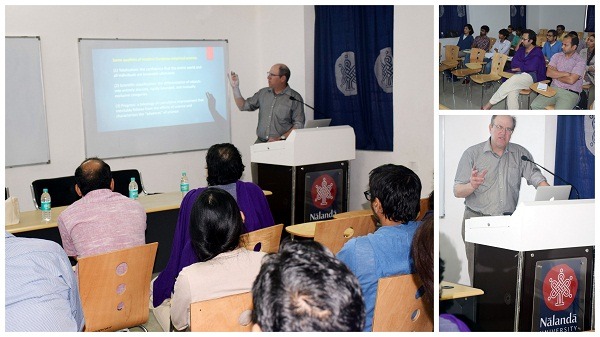SHS Distinguished Lecture: Deciding Who Counts-Hindus and Muslims in the Indian Census
March 24, 2017
Professor Peter Gottschalk, Professor of Religion, Wesleyan University, USA delivered a lecture titled “Deciding Who Counts: Hindus and Muslims in the Indian Census” on March 23, 2017 at Nalanda University.
In this lecture Mr. Gottschalk, discussed how census operations in India are more than just an effort to take a demographic snapshot of its citizenry. He talked about how the census implicitly helps shape the identities of individuals and their understanding of their nation.
According to Professor Gottschalk, India’s two centuries of subjugation to European imperialism transformed the way Indians viewed themselves and proved influential over the last seventy years of politics in independent India. The questions that governments choose to include in their censuses are not self-given hence they reflect the government’s perspectives about the major social categories that influence social stability and governance. He also explained how historically these questions imply assumptions about not only the sub- categories that make up categories such as race, religion, gender, or class, but also about the nature of social categorization and belonging itself.

Professor Peter Gottschalk, Professor of Religion, Wesleyan University, USA delivering the lecture at Nalanda University
Bio-Sketch of Professor Peter Gottschalk
Peter Gottschalk is Professor of Religion at Wesleyan University. His scholarship concentrates on the dynamics of cultural interpretation at the intersection of Muslim, Hindu, Christian, and secular traditions, especially in South Asia, the U.K., and the U.S. He is interested particularly in exploring the roles of comparison and categories in how communities understand the world and define in- and out- groups. Most recently, Professor Gottschalk has published Religion, Science, and Empire: Classifying Hindus and Muslims in British India and American Heretics: Catholics, Jews, Muslims, and the History of Religious Intolerance.